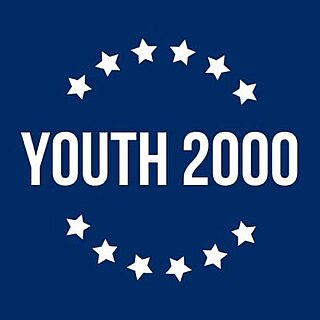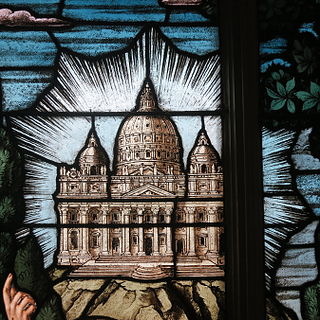Related Research Articles

Pope Benedict XVI is a retired prelate of the Catholic church who served as the head of the church and the sovereign of the Vatican city state from 2005 until his resignation in 2013. Benedict's election as pope occurred in the 2005 papal conclave that followed the death of Pope John Paul II. Benedict chose to be known by the title "pope emeritus" upon his resignation.

Nostra aetate is the Declaration on the Relation of the Church with Non-Christian Religions of the Second Vatican Council. Passed by a vote of 2,221 to 88 of the assembled bishops, this declaration was promulgated on 28 October 1965 by Pope Paul VI.

Marcel François Marie Joseph Lefebvre was a French Catholic archbishop who greatly influenced modern traditional Catholicism. In 1970, he founded the Society of Saint Pius X (SSPX), a community to train seminarians, in the village of Écône, Switzerland. In 1988, he was excommunicated from the Catholic Church for consecrating four bishops against the express prohibition of Pope John Paul II.

The Dicastery for the Doctrine of the Faith (DDF) is the oldest among the departments of the Roman Curia. Its seat is the Palace of the Holy Office in Rome. It was founded to defend the Catholic Church from heresy; today, it is the body responsible for promulgating and defending Catholic doctrine. It was formerly called the Supreme Sacred Congregation of the Roman and Universal Inquisition; between 1908 and 1965 the Supreme Sacred Congregation of the Holy Office; and then until June 2022 the Congregation for the Doctrine of the Faith. It is still informally known as the Holy Office.

Traditionalist Catholicism is characterized by beliefs, practices, customs, traditions, liturgical forms, devotions, and presentations of Catholic teaching before the Second Vatican Council (1962–1965), in particular attachment to the Tridentine Mass, which traditionalist Catholics call "the Latin Mass", "the traditional Mass", "the ancient Mass", "the immemorial Latin Mass", "the Mass of All Time", "the Mass of the ages" or "the Mass of the Apostles", "the Traditional Latin Mass", or "the Extraordinary Form of the Roman Rite".

During its long history, the Catholic Church has been subject to criticism regarding various beliefs and practices. Within the Church, this includes differences of opinion regarding the use of Latin at Mass, and the subject of clerical celibacy. In the past, different interpretations of scripture and critiques of clerical laxity and opulence contributed to separations such as the schism with the Eastern Orthodox Church and the Protestant Reformation. The Catholic Church has also been criticized for its active efforts to influence political decisions, such as the Church's promotion of the Crusades and its involvement with various 20th-century nationalist regimes. More recent criticism focuses on alleged scandals within the Church, particularly alleged financial corruption and the Catholic Church's sexual abuse scandals.

The Prayer to Saint Michael the Archangel usually refers to one specific Catholic prayer to Michael the Archangel, among the various prayers in existence that are addressed to him. It falls within the realm of prayers on spiritual warfare. From 1886 to 1964, this prayer was recited after Low Mass in the Catholic Church, although not incorporated into the text or the rubrics of the Mass. Other prayers to Saint Michael have also been officially approved and printed on prayer cards.

Raymond Leo Burke is an American prelate of the Catholic Church. A bishop, cardinal, and the incumbent patron of the Sovereign Military Order of Malta, he led the Archdiocese of St. Louis from 2004 to 2008 and the Diocese of La Crosse from 1995 to 2004. From June 2008 to November 2014, he was the prefect of the Supreme Tribunal of the Apostolic Signatura.

Catholic charismatic renewal is a movement within the Catholic Church that is part of the wider charismatic movement across historic Christian churches. It has been described as a "current of grace". It began in 1967 when Catholics from Duquesne University attended a Protestant worship service and claimed to have been "baptized in the Holy Spirit". It is heavily influenced by American Protestantism, especially Pentecostalism, with an emphasis on having a "personal relationship with Jesus", deep emotional experiences, and expressing the "gifts of the Holy Spirit".
Michael Treharne Davies was a British teacher and traditionalist Catholic writer of many books about the Catholic Church following the Second Vatican Council. From 1992 to 2004 he was the president of the international Traditionalist Catholic organisation Foederatio Internationalis Una Voce and was responsible for the unification of Una Voce America.

The Roman Rite is the primary liturgical rite of the Latin Church, the largest of the sui iuris particular churches that comprise the Catholic Church. It developed in the Latin language in the city of Rome and, while distinct Latin liturgical rites such as the Ambrosian Rite remain, the Roman Rite has gradually been adopted almost everywhere in the Latin Church. In medieval times there were numerous local variants, even if all of them did not amount to distinct rites, yet uniformity increased as a result of the invention of printing and in obedience to the decrees of the Council of Trent of 1545–63. Several Latin liturgical rites that survived into the 20th century were abandoned voluntarily after the Second Vatican Council. The Roman Rite is now the most widespread liturgical rite not only in the Roman Catholic Church but in Christianity as a whole.
The Liturgical Movement was a 19th-century and 20th-century movement of scholarship for the reform of worship. It began in the Catholic Church and spread to many other Christian churches including the Anglican Communion, Lutheran and some other Protestant churches.

La Civiltà Cattolica is a periodical published by the Jesuits in Rome, Italy. It has been published continuously since 1850 and is among the oldest of Catholic Italian periodicals. All of the journal's articles are the collective responsibility of the entire "college" of the magazine's writers even if published under a single author's name. It is the only one to be directly revised by the Secretariat of State of the Holy See and to receive its approval before being published.

John Christopher "Aidan" Nichols is an English academic and Catholic priest.
The Leonine Prayers are a prescribed set of Catholic prayers for recitation by the priest and people after Low Mass required within the Roman Rite of the Latin Church from 1884 to 1965. They are commonly called Prayers after Mass. The name derives from the fact that they were introduced by Pope Leo XIII. They were slightly modified by Pope Pius X.

Youth 2000 is an international Catholic movement for young people, generally between the ages of 16 and 35. Youth 2000's activities generally include the running of both community prayer groups and weekend retreats for young people. At their retreats, which are between two and five days long, teens and adults alike share their love for Jesus through the Eucharist, adoration, and praise and worship. It has been active since 1990 in the UK and in Ireland in 1993. The first weekly prayer group was held at the Carmelite Priory in Kensington.
The Roman Catholic Church in the 20th century had to respond to the challenge of increasing secularization of Western society and persecution resulting from great social unrest and revolutions in several countries. It instituted many reforms, particularly in the 1970s under the Vatican II Council, in order to modernize practices and positions. In this period, Catholic missionaries in the Far East worked to improve education and health care, while evangelizing peoples and attracting numerous followers in China, Taiwan, Korea, and Japan.
Triumph was a monthly American magazine published by L. Brent Bozell, Jr. from 1966 to 1976. It commented on religious, philosophical, and cultural issues from the traditionalist Catholic perspective.
Christopher A. Ferrara is an American Roman Catholic lawyer, anti-abortion activist, political pundit, and writer. He is the founder and president of the American Catholic Lawyers Association. He is also a regular columnist of The Remnant, a traditionalist Catholic newspaper.

Catholic ecclesiology is the theological study of the Catholic Church, its nature and organization, as described in revelation or in philosophy. Such study shows a progressive development over time. Here the focus is on the time leading into and since the Second Vatican Council (1962–1965).
References
- ↑ Christian Order official website
- ↑ "The Vanishing Schism Revisited" Archived 14 May 2008 at the Wayback Machine , by John Beaumont, Fidelity magazine, November 1996
- ↑ "Faith and Community Threatened? Roman Catholic Responses to the Welfare State, Materialism and Social Mobility, 1945–62" by Joan Keating, Twentieth Century History, Volume 9, Number 1, Oxford University Press
- ↑ Vincent P. Miceli (1985). Women Priests and Other Fantasies . Christopher Publishing House. p. 49. ISBN 978-0-8158-0423-9 . Retrieved 2 May 2020.
- ↑ "The Kingship of Christ Since Vatican II" [ permanent dead link ], by Michael Davies, The Angelus
- ↑ Michael Davies obituary Archived 17 July 2010 at the Wayback Machine , Leo Darroch, 27 April 2005, Mass of Ages, hosted on the website of Una Voce
- ↑ About Us, Christian Order
- ↑ Michael McGrade (October 2002). "The Last Trojan Horse?". Christian Order. Archived from the original on 16 May 2008. Retrieved 8 September 2008.
- ↑ New Oxford Review. Vol. 75. American Church Union. 2008. pp. 11–19. Retrieved 2 May 2020.
- ↑ "All on the anti-Church bandwagon", by Kieron Wood, The Sunday Business Post, 13 November 2005
- ↑ Anthony Nevard (August–September 1998). "Theistic Evolution and the Mystery of FAITH". Christian Order. Retrieved 8 September 2008.
- ↑ "Editorial: Evolving Into Atheism". Christian Order. January 2006. Retrieved 8 September 2008.
- ↑ Faith-based fascists bridging the waters, Searchlight magazine, Mike Reynolds, March 2004
- ↑ Catholic Culture :Site review: Christian Order